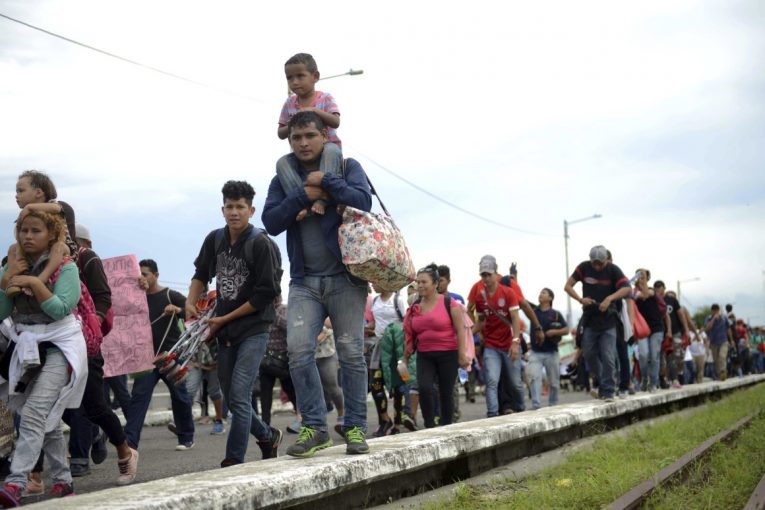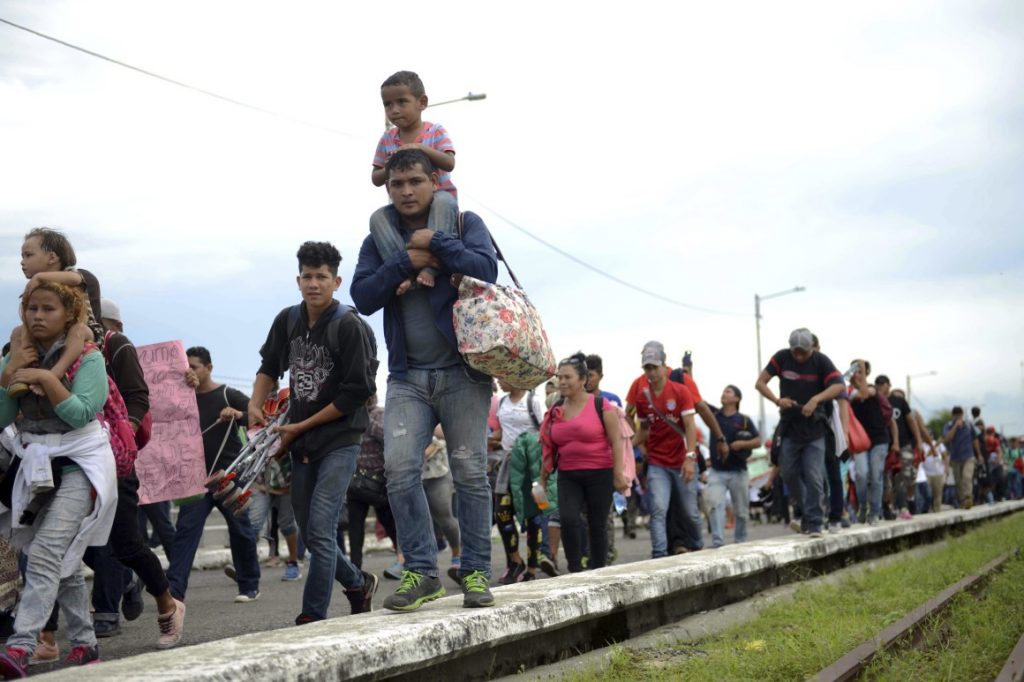

By Connor Gorman, David Salkoff, KateMarie Boccone, Morganne Blais-McPherson and members of the Young Democratic Socialists of America at UC Davis
The arrival of the much mediatized “migrant caravan” to the U.S. border is one of the most salient political and human rights issues of our current moment. The caravan, composed of thousands of Central American asylum seekers (some of whom have already reached the U.S. border [1]), is a side effect of the trade practices, political violence, and environmental degradation that capitalism and U.S. policy create. The Young Democratic Socialists of America (YDSA) at UC Davis commits to supporting all members of the caravan in their struggle for dignity and insists on an understanding that crises like this one will continue to take place as long as capitalism and U.S imperialism exist.
U.S. corporations and policies play a central role in the economic hardships that many Central American workers encounter daily. Some of the most prominent policies contributing to this inhumane situation are so-called “free trade” agreements, like TPP, NAFTA, and DR-CAFTA, which reduce the ability of governments to challenge corporate exploitation and enact the democratic will of their people [2]. For example, the importing of U.S. grain reduces the value of products grown in many Central American countries. Furthermore, the ability of transnational corporations to sue governments over lost profits greatly discourages governments from acting in the best interest of their citizens.
Additionally, pollution and climate change threaten both the work and the lives of many in Central America. Corporate practices in these countries have limited available natural resources by contaminating water sources and have exacerbated the effects of climate change that already see large portions of agricultural land rendered unusable [2].
We also recognize that
economic hardships are directly tied to the physical violence that many Central
American countries currently experience, and from which thousands of migrants
are fleeing [1]. The U.S. has been complicit in, and at times  financially
backed, much of this violence. For example, approximately 430 Mayan villages
were slaughtered at the hands of the U.S.-backed Guatemalan military as part of
a counterinsurgency campaign [3,4]. Following this were years of
narcotics-related violence when Guatemala became a corridor for cocaine after
the U.S. poured billions into halting South American routes (as well as to
squash left-wing insurgencies, such as in Plan Colombia). This is the
historical context in which the late Jakelin Caal Maquín’s family “decided” to
make the dangerous trip to the U.S. border [5]. Unfortunately, Jakelin and her
family are not alone. Millions are affected by physical violence, however,
asylum in the U.S. is only offered to members of particular social groups [6].
financially
backed, much of this violence. For example, approximately 430 Mayan villages
were slaughtered at the hands of the U.S.-backed Guatemalan military as part of
a counterinsurgency campaign [3,4]. Following this were years of
narcotics-related violence when Guatemala became a corridor for cocaine after
the U.S. poured billions into halting South American routes (as well as to
squash left-wing insurgencies, such as in Plan Colombia). This is the
historical context in which the late Jakelin Caal Maquín’s family “decided” to
make the dangerous trip to the U.S. border [5]. Unfortunately, Jakelin and her
family are not alone. Millions are affected by physical violence, however,
asylum in the U.S. is only offered to members of particular social groups [6].
The United States, while contributing to the situation in Central America through its capitalist practices, has also refused to allow migrants entry, and has even gone so far as criminalizing their migration. There are numerous examples throughout U.S. history of both systematic detention and deportation of entire ethnic groups. This is why reforming ICE (the federal Immigration and Customs Enforcement agency that was first formed in 2003) is not a viable option. ICE has been instrumental in policies that separate families and deport people in large numbers. ICE is also known to charge people with gang affiliations despite having no evidence for these claims [7].
Within our universities, the UC Office of the President (UCOP) has been reluctant to understand the unique difficulties experienced by undocumented students and workers. Janet Napolitano, the current President of the UC system, was Secretary of Homeland Security under President Barack Obama and participated in creating policies that resulted in a higher level of deportation than any president preceding him. Meanwhile, Gary May, the current UC Davis chancellor, earns almost $300,000 per year from his seat on the board of directors at Leidos Corp., a defence and technology company that is a major supplier of surveillance equipment for the Department of Homeland Security’s border patrol [8]. These examples highlight the moral bankruptcy of a federal and educational system controlled by capital.
In order to address the problems that the existence of, and racist rhetoric around, the migrant caravan so clearly exposes, we need to pressure politicians and our elected officials to support policies that promote structural changes which benefit immigrants and refugees. One such campaign is the current effort to abolish ICE. All of us, natural-born U.S. citizens and immigrants alike, should be able to live in dignity with those we care most about. The YDSA at UC Davis is committed to supporting these migrants through fundraising efforts and additional actions. We ask that those in the community interested in showing solidarity with the migrant caravan and opposing the current administration’s harmful rhetoric and policies contact us at the provided email address for more details regarding our next steps.
In Solidarity,
YDSA at UC Davis
You can reach us by email at ydsaucdavis@gmail.com and on Facebook at YDSA at UC Davis
Donate money for legal services for indigent deportees, migrants and refugees in Tijuana, Mexico: Al Otro Lado – https://alotrolado.org/take-action/donate/
Donate money to support migrants in detention and those recently released, as well as their families: Otay Mesa Detention Resistance – https://www.otaymesadetentionresistance.org/?fbclid=IwAR2plOj-vkeOyvVdCXJsz2LMidmPxY2apGcvMzL0nz3Iwad7_Ia8cVYpMPQ
[1]http://socialistworker.org/2018/11/15/how-we-can-organize-to-welcome-the-caravan
[2] https://fpif.org/free-trade-done-central-america/
[4] http://www.genocidewatch.org/guatemala.html
[5]https://www.thenation.com/article/guatemala-refugee-crisis-jakelin-caal-maquin/
[6] https://www.sacbee.com/news/local/news-columns-blogs/marcos-breton/article219191335.html
[7] https://www.dsausa.org/files/2018/06/Zine-abolish-ice.pdf

Having worked as a general medical officer near the Arizona border for two years, I had direct exposure to the issue of border security. I deeply appreciate this article for articulating more than simply a “good guys” vs “bad guys” discussion of the border issues and why people need to leave their own countries in the first place.
There has not been near enough discussion on why people are leaving their own countries and what we can do about that
There are almost 8 billion people in the world. See https://en.wikipedia.org/wiki/Behavioral_sink for details
I agree, there are almost 8 billion people in the world